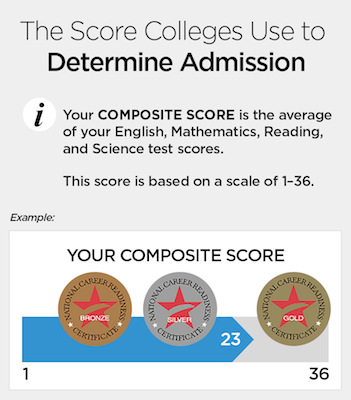Q: Which ACT® scores do colleges care about most?
A: Your individual test scores and your composite score.
Still, there are a lot more numbers on your score report than just those! Learn how to read your ACT scores, and use this ACT scoring guide to focus on the numbers that are most important to colleges.
When students and schools talk about ACT scores, they typically mean the composite score. Here's how to read your ACT Scores.

Start with Your Individual Test Scores
Scores are reported on a scale of 1 to 36 (36 being the highest score possible) for each of the four ACT tests:
- English
- Math
- Reading
- Science
Your raw score for each test is the total number of questions you got right. Remember, there is no penalty for wrong answers, so you shouldn’t leave any blanks!
ACT converts your raw scores to the scale of 1–36. Each test has its own conversion scale.
Composite Score = Average Score
Your composite score is the average of your English, Math, Reading, and Science test scores, rounded to the nearest whole number. This score, on a scale of 1–36, is the score colleges primarily use to determine admission.
ACT Percentiles
Next to each score is an ACT percentile ranking. Your rank shows how you performed on the test relative to other people who took it on the same day. For example, a percentile ranking of 87% means you scored higher than 87% of the students who took the test, and the other 13% scored higher than you.
Read More: What's a Good ACT Score?
ACT Writing Score
If you take the “optional” essay (by signing up for the ACT with Writing), you’ll receive a separate writing score. Some schools that you apply to may want to see your writing score, so we suggest you take it. Your writing score doesn’t factor into your composite score.
Using Your ACT Score Report
Use your ACT score report to identify your strengths and weaknesses, so you know what to focus on if you decide to take the ACT again. Are you strongest in English and Math? Work to raise those scores as high as you can.
The four tests are weighted equally, so improving individual test scores will help you raise your overall score. And if you are applying to colleges that superscores the ACT, improving your indviidual test scores will help you raise your overall, super composite score.
Where Will Your Scores Take You?
Now that you've got your ACT scores back, compare them with the score ranges for accepted students at the colleges on your wishlist. You can find scores and acceptance rates for many schools in our college profiles.
Do your scores make your dream college a reach? With a little prep you CAN improve your score. Raising your ACT score by even 1 point can significantly boost your chance of admission at many schools, plus snag you additional scholarship dollars.

Scores You Shouldn't Stress About
While admissions officers will certainly SEE the rest of the scores on your report, they'll mainly use your composite score to evaluate your application. Here's a quick overview of what else you'll find on your report.
7 Subscores
Some of the ACT test scores have subcategories. These scores are reported on a scale of 1 to 18 and as percentiles. Subscores provide you with more detail about your performance, but they are not typically used by colleges or universities.
| Test | Subscore | Score Range |
|---|---|---|
| English |
|
1–18 |
| Math |
|
1–18 |
| Reading |
|
1–18 |
| Science | None | N/A |
Cross-Test Scores
These are definitely not scores to worry about! Use them if they are helpful to you, but rest assured that colleges aren’t evaluating them as part of your application.
| Score | What it is | How It's Scored |
|---|---|---|
| STEM | Average of Math and Science test scores | 1–36 |
| ELA | Average of English, Reading and Writing test scores (if you choose to take the writing test) | 1–36 |
| Understanding Complex Texts | Based on performance on all reading passages | Below Proficient, Proficient, or Above Proficient |
| Progress Toward Career Readiness | Based on ACT Composite Score | Bronze, Silver, or Gold |
College-Readiness Benchmark Scores
On your score report, ACT also indicates if you met their “College Readiness Benchmark Scores":
- 18 in English
- 22 in Math
- 21 in Reading
- 24 in Science
ACT maintains that these benchmarks can predict college “success,” defined by a “50 percent or higher probability of earning a B or higher in the corresponding college course or courses.”
Still, don't assume that these numbers will make or break you in college. These scores and their meaning have been determined by ACT’s own research and data, not by any studies done by colleges and universities themselves.
Build the right ACT prep plan for you
Our private tutors will help you build a prep plan that's customized to your score goals, study habits, and schedule.
Read More
Explore Colleges For You
Connect with our featured colleges to find schools that both match your interests and are looking for students like you.
Get Started on Athletic Scholarships & Recruiting!
Join athletes who were discovered, recruited & often received scholarships after connecting with NCSA's 42,000 strong network of coaches.
Best 390 Colleges
168,000 students rate everything from their professors to their campus social scene.



